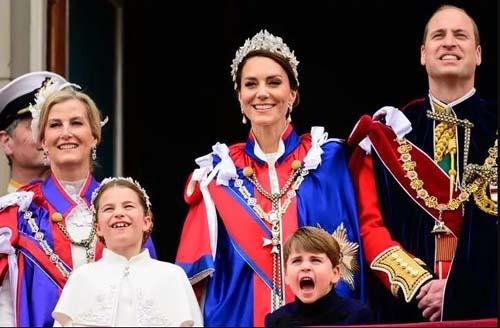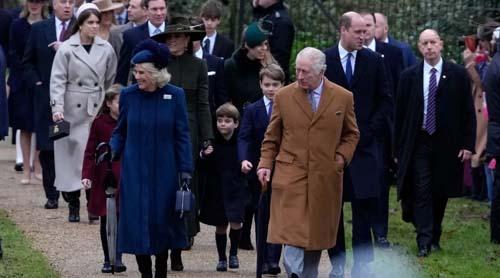
The British royal family’s highs and lows of 2023
London: After a tumultuous final few years of Queen Elizabeth’s reign, King Charles came to the throne at a time when steadying the ship was never more important.

And as he ends his first full year as monarch he can look back on a 12 months that has mercifully lacked the drama of many of those that went before. Yet, from the highs of the coronation to the lows of the monarchy’s waning popularity in the polls, the year has still been full of ups and downs. We take a look at some of the key events of the royal family’s 2023.

No one was expecting 2023 start well for the working royals with Prince Harry’s damning memoir Spare scheduled for release on January 10. Yet despite Harry (as journalist Tom Bradby put it) taking “a flame-thrower” to his bridges with the royals, the book ended up being an astonishing reminder of how quickly even the most dramatic news cycle can move on. The Prince and his truly bombshell revelations dominated the agenda during the middle of January. But by the time the Princess of Wales launched her Shaping Us campaign at the end of the month, the front pages were ready for a new focus.

First Lady Elke Buedenbender, Queen Camilla, King Charles III and President Frank-Walter Steinmeier attend a ceremonial welcome at Brandenburg Gate in Berlin, on March 29, 2023.
If Spare’s portrait of the King had made the world think more negatively of him, there was zero evidence of this by the time he carried out his first overseas State Visit to Germany in March. Charles made history by being the first British monarch to address the German parliament and was rewarded with a standing ovation and significant praise in German media. Positive headlines in the UK followed, such as “Why Germans are going wild for King Charles” and “Why the Germans think King Charles is wunderbar!”

The sure-footed performance of this first State Visit put the King in a strong position in the run-up to his May coronation. Despite initial speculation it would be scaled back, in the end the British Government pressed ahead with full pomp and pageantry. The world’s media descended on London and every detail of the 1,000-year-old ceremony—the likes of which has not survived anywhere else in Europe—was dissected with fascination. As King Charles and the once-unthinkable figure of Queen Camilla waved to cheering crowds from the Buckingham Palace balcony, the event was largely hailed a success.
Unlike in 1953 when Queen Elizabeth was crowned, there were signs that cracks have formed in the monarchy’s relationships with the public. Polls this year have show that young people are now more likely to want an elected head of state and that the monarchy’s popularity fell to an all-time low. Protestors chanting “Not My King” made themselves heard during the coronation and even more so at the King’s first State Opening of Parliament in November. And reporting such as the Guardian newspaper’s ongoing investigation into the Cost of the Crown and the royal family’s links to slavery have become increasingly prominent.

In a sign he believes that continuity is one of the monarchy’s greatest strengths, King Charles has been at great pains to emphasize tradition since the start of his reign. He has followed his late mother’s model more closely than many expected and done or said little to rock the boat. His September State Visit to France was very much in this vein and reinforced his credentials as a reliable diplomat.
However, during his trip to Kenya in November the King also demonstrated an understanding that a new approach is needed when it comes to royal visits to former British colonies. While stopping short of an apology—something that would have to be decided by the Government—the King did not shy away from putting the wrongs of the past at the forefront of his Kenya trip. He used a key speech in Nairobi to say there was “no excuse” for “abhorrent and unjustifiable acts of violence committed against Kenyans as they waged, as you said at the United Nations, a painful struggle for independence and sovereignty.” Charles received criticism for the lack of apology but, unlike William and Kate’s tour of the Caribbean, the trip will was far from a disaster.
The fact that the King and Queen’s overseas visits were centre-stage this year serves as a reminder that monarchy is designed to shore up those at the top. William carried out a brief solo trip to Poland in March to visit troops near the Ukraine border, and another short trip to New York in September ahead of the Earthshot Prize awards in November. He and Kate also represented the King at Crown Prince Hussein’s wedding to Rajwa Al Saif in Jordan in June. But for most of 2023, William and Kate have largely focussed their energies on engagements closer to home.
Kate launched Shaping Us at the start of the year and William announced his own ambitious initiative to end homelessness in June. Homewards saw the Prince travel to six locations in England, Scotland, Wales and Northern Ireland to bring together experts and spearhead ways to prevent homelessness. Both projects demonstrate how the couple wants to work—by providing long-term commitment to specific areas and by leaning heavily on their convening power and ability to raise awareness.
The royal year was heading for a relatively quiet end until the publication of Endgame reignited controversy. The fact that the Dutch edition of the book was pulled from the shelves for naming in error royals who allegedly discussed Archie’s skin color elevated the drama around the book which already dealt several blows to the working royals. Yet, much in the same way as the year started with Spare, the furor ebbed away and the monarchy stayed standing.
The final engagements of 2023 proved to be a festive family affair. Kate was joined by the extended royal family and the Middletons for her annual Westminster Abbey service and she even brought Prince George, Princess Charlotte and Prince Louis to help out with a baby bank in the run-up to the festive season. “You can see how rewarding this kind of work is, knowing that you’re helping others,” she said to her eldest son in an insight into the philosophies she is instilling in the future King.
This philosophy of duty first is one that King Charles has been keen to emphasize throughout the year. During his Christmas broadcast, where he reflected on the past 12 months, the coronation was mentioned but only briefly and largely in the context of the volunteers who were invited into Westminster Abbey. Instead, the King focused on the official engagements and charity visits undertaken by the royals and ended the year emphasizing the themes of faith, service and duty.
